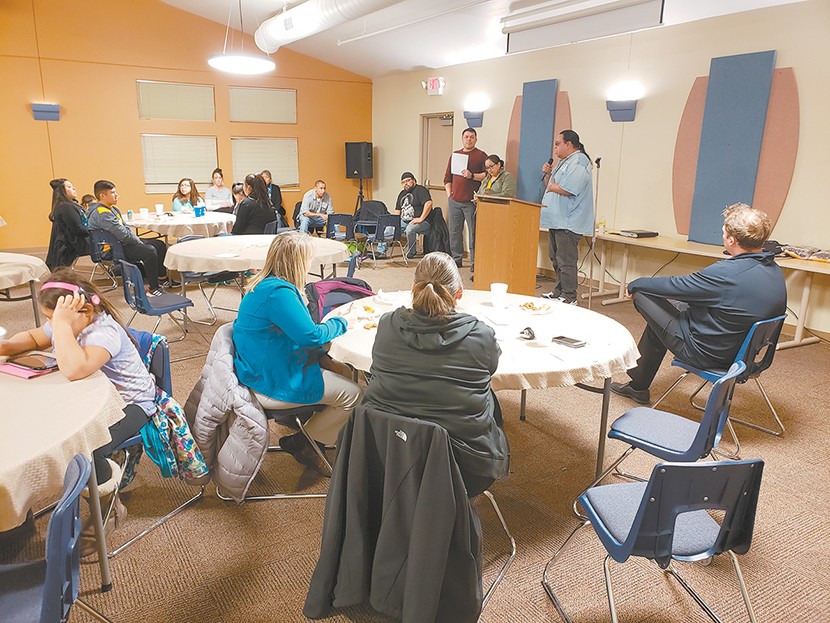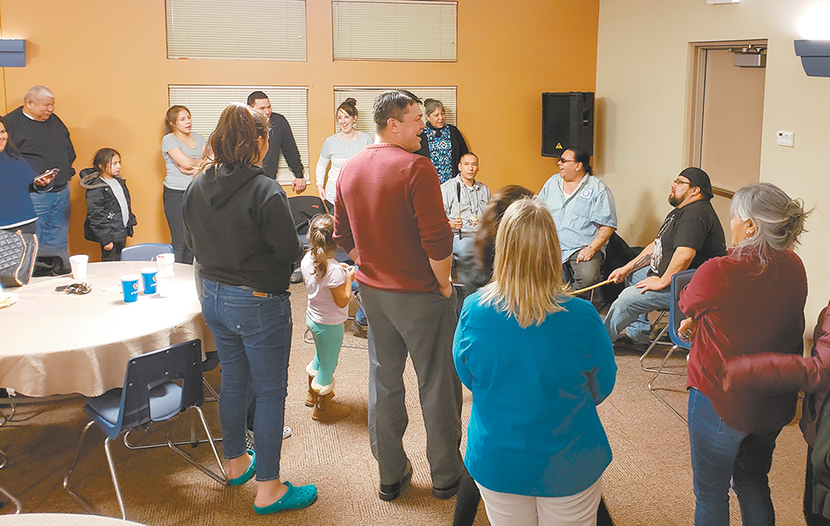
By Amikogaabawiikwe (Adrienne Benjamin) Mille Lacs Band Member
On February 27, Onamia Public Schools hosted their annual LIEPC (Local Indian Education Parent Committee) public hearing to cast their concurrence/non-concurrence vote to the Minnesota Department of Education.
The Red Road Drum group provided an honor song for all those in attendance, and dinner was served — delicious Indian Tacos prepared by Dawn Day. After the meal, the event was emceed by School Board Chair and LIEPC Vice Chair Virgil Wind.
The night started with Onamia Public Schools Superintendent J.J. Vold talking to the group about positive things that are happening at Onamia Schools. He started out by saying how proud he was that the school has had a successful powwow now for five years running. He also pointed out a new American Indian Studies class offering this past semester, which was taught by Chris Nayquonabe. The class focused on traditional art practice, treaty law, and indigenous history.
Another offering that Superintendent Vold was extra proud of was the college-level ITV Ojibwe language class taught by Anton Treuer that is now in its second semester in collaboration with Bemidji State University. Students who attend this class receive college credit for their efforts. Vold also talked about credit recovery classes offered by the Onamia ALC in collaboration with the Indian Education Program. Many students who were behind in credits have been able to get back on track due to this new initiative.
Next on the microphone was Chris Nayquonabe, who talked about a future vision for the school and Indian Education. Chris talked about her current plans to enact a UNITY Youth Council chapter within the Onamia School District. "This opportunity will be a great way to keep youth current on events that are happening on a national scale and allow them more of a voice on a local level as well," Chris said. UNITY (United National Indian Tribal Youth) is a national organization whose mission is "to foster the spiritual, mental, physical, and social development of American Indian and Alaska Native youth, and to help build a strong, unified, and self-reliant Native America through involvement of its youth." They hold a yearly and midyear conference that allows youth to learn about, discuss, and vote on relevant topics in Indian Country.
The microphone was then opened up to others in attendance to talk about their own vision for the future of Onamia Schools. Community member Terry Kemper spoke about the importance of incorporating the natural world into Ojibwe language learning. "It’s not only important to teach youth the language, but they have to experience the reasons that we do things as well, and why we have always done things in these ways."
The hearing is held yearly by law to allow the school to hear community input, concerns, and suggestions. Individuals then have the opportunity to vote concurrence, which means they believe that the school is doing the best they can to serve the Native American population within their school district, or they can vote non-concurrence, which means they don’t believe that the school is doing all they can to provide Native American students with the best education possible. This year, the group voted for concurrence with a vote of 28-2. These results and the suggestions that were put forward will then be sent to the Minnesota Department of Education for recording and to keep the school accountable to the needs of Native American students in the district.
My View — A Note from the Author
I wasn’t just an objective reporter at this meeting; I also shared my vision about the future of Onamia Schools and issued a challenge to the school’s leadership as part of the public hearing.
Specifically, I challenged the school to hire staff that matches the ethnic makeup of the students. With a 54 percent Native population, there are only two Native American employees at the school, one being Chris Nayquonabe, the Director of the Indian Education Program.
"Children need to see themselves in the school in that way," I told the group. "They need to see people every day who look like them to look up to and who deeply understand them culturally."
I encourage other Indian parents to participate in their Local Indian Education Parent Committee, attend public hearings, and share your thoughts and concerns with your local school boardt, as this is the only way that our concerns are heard and taken into consideration.
— Amikogaabawiikwe (Adrienne Benjamin)
